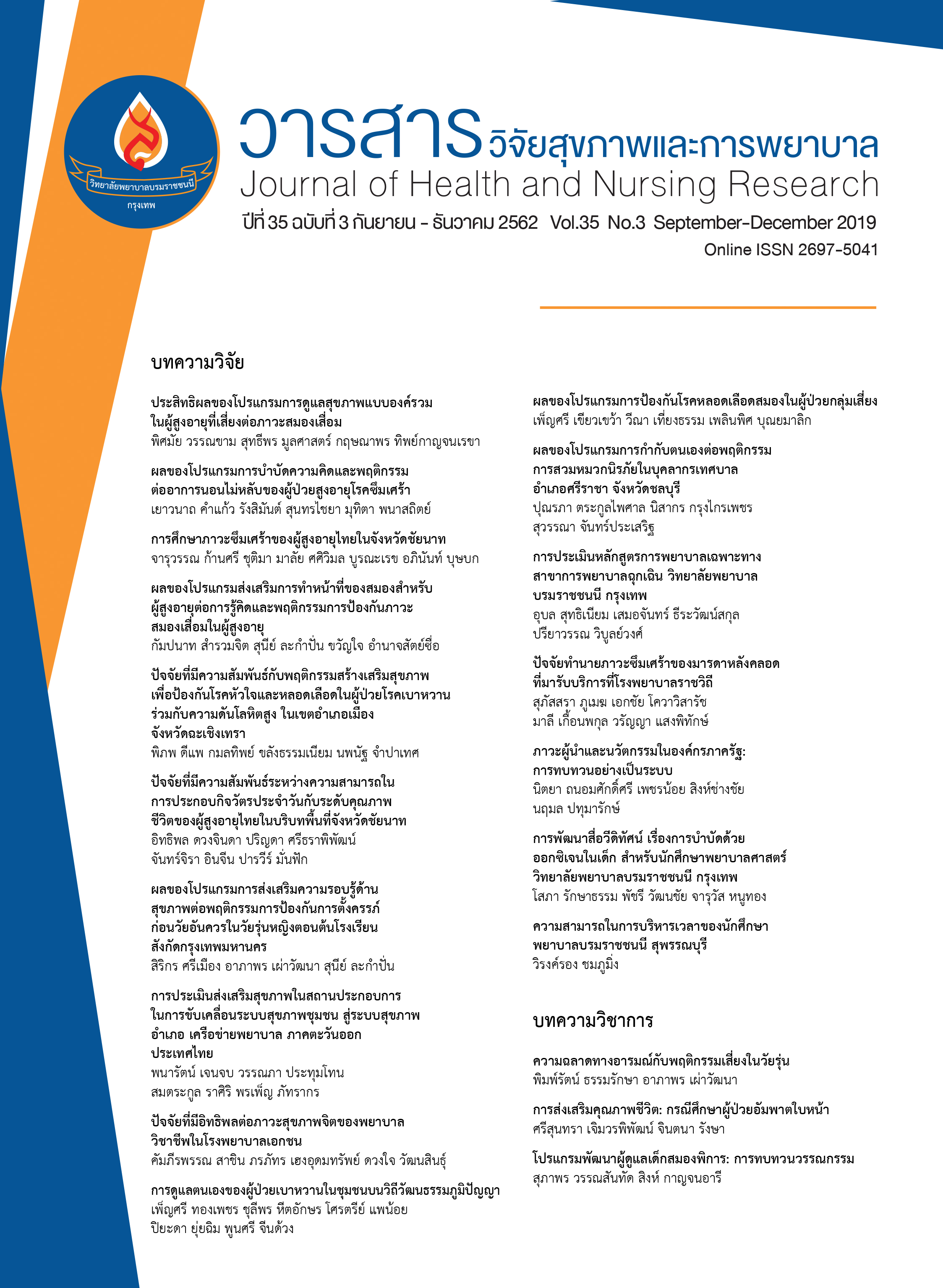ผลของโปรแกรมการบำบัดความคิดและพฤติกรรมต่ออาการนอนไม่หลับ ของผู้ป่วยสูงอายุโรคซึมเศร้า
คำสำคัญ:
โปรแกรมการบำบัดความคิดและพฤติกรรม, อาการนอนไม่หลับ, ผู้ป่วยสูงอายุโรคซึมเศร้าบทคัดย่อ
การวิจัยเชิงทดลองแบบสุ่มและมีกลุ่มควบคุมนี้ มีวัตถุประสงค์เพื่อศึกษาผลของโปรแกรมการบำบัดความคิดและพฤติกรรมต่ออาการนอนไม่หลับในผู้ป่วยสูงอายุโรคซึมเศร้า กลุ่มตัวอย่างเป็นผู้ป่วยโรคซึมเศร้าที่มีอายุ 60 ปีบริบูรณ์ขึ้นไป มีอาการนอนไม่หลับอยู่ในระดับน้อยจนถึงปานกลางจำนวนทั้งหมด 60 คน ที่มารับบริการ ณ โรงพยาบาลผู้สูงอายุแห่งหนึ่งในกรุงเทพมหานคร เลือกกลุ่มตัวอย่างตามคุณสมบัติที่กำหนด แบ่งเป็นกลุ่มทดลองและกลุ่มควบคุมโดยการสุ่มเข้ากลุ่ม กลุ่มละ 30 คน กลุ่มทดลองได้รับโปรแกรมการบำบัดความคิดและพฤติกรรม จำนวน 5 ครั้ง สัปดาห์ละ 1 ครั้ง ครั้งละ 60-90 นาที และกลุ่มควบคุมได้รับการพยาบาลตามปกติ เครื่องมือที่ใช้ในการทำวิจัยคือ 1) โปรแกรมการบำบัดความคิดและพฤติกรรม 2) แบบประเมินความรุนแรงของอาการนอนไม่หลับ ตรวจสอบคุณภาพของเครื่องมือทั้งหมดจากผู้ทรงคุณวุฒิจำนวน 3 ท่าน ด้วยการหาความตรงเชิงเนื้อหา (Content Validity Index: CVI) ได้เท่ากับ .81 และวิเคราะห์ความเที่ยงของแบบประเมินในผู้ป่วยสูงอายุโรคซึมเศร้าจำนวน 30 คน โดยนำไปหาค่าสัมประสิทธิ์แอลฟาของ ครอนบาคได้เท่ากับ .73 วิเคราะห์ข้อมูลด้วยสถิติเชิงพรรณนา และสถิติทดสอบค่าที (t-test) ผลการวิจัยพบว่า
1) คะแนนเฉลี่ยอาการนอนไม่หลับของผู้ป่วยสูงอายุโรคซึมเศร้าในกลุ่มทดลอง หลังการได้รับโปรแกรมการบำบัดความคิดและพฤติกรรม (Mean = 6.70, SD. =3.04) ต่ำกว่าก่อนได้รับโปรแกรมการบำบัดความคิดและพฤติกรรม (Mean = 14.43, SD. =3.30) อย่างมีนัยสำคัญทางสถิติ (t=16.22, p<.001)
2) ผลต่างของค่าเฉลี่ยคะแนนอาการนอนไม่หลับของผู้ป่วยสูงอายุโรคซึมเศร้าก่อนและหลังการทดลองของกลุ่มที่ได้รับโปรแกรมการบำบัดความคิดและพฤติกรรม ( =7.73, SD. =2.62) สูงกว่ากลุ่มที่ได้รับการพยาบาลตามปกติ ( =.40, SD. =1.07) อย่างมีนัยสำคัญทางสถิติ (t=14.23, p<.001)
ผลการวิจัยครั้งนี้สนับสนุนว่าโปรแกรมการบำบัดความคิดและพฤติกรรมสามารถลดอาการนอนไม่หลับในผู้ป่วยสูงอายุโรคซึมเศร้า บุคลากรทางสุขภาพสามารถนำโปรแกรมการบำบัดความคิดและพฤติกรรมไปใช้เป็นการบำบัดอีกทางเลือกหนึ่งในการลดอาการนอนไม่หลับในผู้ป่วยสูงอายุโรคซึมเศร้าได้
Downloads
เอกสารอ้างอิง
2. Hirshkowitz M, Sharafkhaneh A. Sleep disorder. In: Sadock B, Sadock VA, Ruiz P, editors. Kaplan & Sadock’s comprehensive textbook of psychiatry. 10th ed. Philadelphia: Lippincott Williams & Wilkins; 2017. p. 2083-2109.
3. Bluestein D, Rutledge CM, Healey AC. Psychosocial Correlates of Insomnia Severity in Primary Care. J Am Board Fam Med 2010;23(2):204–11.
4. Kim JM, Stewart R, Kim SW, Yang SJ, Shin IS, Yoon JS. Insomnia, depression, and physical disorders in late life: a 2-year longitudinal community study in Koreans. Sleep 2009;32(9): 1221–8.
5. Gindin J, Shochated T, Chetrit A, Epstein S, Israel YB, Levi S, et al. Insomnia in long-term care facilities: A comparison of seven Europeann countries and Israel: The services and health for elderly in long term care study. American Geriatrics Society 2014;62(11):2033-9.
6. Chirapongse J. Selected factors related to insomnia among elderly patients with major depressive disorder [master’s thesis]. [Bangkok]: Chulalongkorn University; 2011. (in Thai).
7. Spiegelhalder K, Regen W, Feige B, Hirscher V, Unbehaun T, Nissen C, et al. Sleep-related arousal versus general cognitive arousal in primary insomnia. Journal of Clinical Sleep Medicine 2012;8(4):431-7.
8. Morin CM, Espie CA. Insomnia a clinician’s guide to assessment and treatment. New York: Plenum; 2003.
9. Morin CM, Vallieres A, Lvers H. Dysfunctional beliefs and attitudes about Sleep (DBAS): Validation of a brief version (DBAS-16). Sleep 2007;30(11):1547-54.
10. Morin CM. Insomnia: psychological assessment and management. New York: Guilford Press; 1993.
11. Gaynes B, Fava M, Rush AJ. Insomnia in patients with depression: A STAR * D report Insomnia in Patients With Depression : A STAR * D Report. CNS spectrums 2010;15(6):394-404.
12. Krystal AD. A compendium of placebo-controlled trials of the risks/benefits of pharmacological treatments for insomnia: the empirical basis for U.S. clinical practice. Sleep Med Rev 2009;13(4):265-74.
13. Mitchell MD, Gehrman P, Perlis M, Umscheid CA. Comparative effectiveness of cognitive behavioral therapy for insomnia: a systematic review. BMC Family Practice [Internet]. 2012. [cited 2017 Nov 11]:1-11. Available from: https://www.ncbi.nlm.nih.gov/pmc/articles/PMC 3481424/
14. Cunningham JEA, Shapiro CM. Cognitive Behavioural Therapy for Insomnia (CBT-I) to treat depression: A systematic review. J Psychosom Res [Internet]. 2018. [cited 2018 Mar 12];106:1-12. Available from: https://doi.org/10.1016/j.jpsychores.2017.12.012
15. Ayabe N, Okajima I, Nakajima S, Inoue Y, Watanabe N. Effectiveness of cognitive behavioral therapy for pharmacotherapy- resistant chronic insomnia: a multi-center randomized controlled trial in Japan. Sleep Med [Internet]. 2018. [cited 2018 Mar 12];50:105–12. Available from: https://doi.org/10.1016/j.sleep.2018.05.038
16. Blom K, Tarkian H, Wiklund T, Danlycke E, Forss M, Lindefors N, et al. Internet-vs. group-delivered cognitive behavior therapy for insomnia: A randomized controlled non-inferiority trial. Behav Res Ther [Internet]. 2015 [cited 2018 Mar 12]:70. Available from: https://doi.org/10.1016/j.brat.2015.05.002
17. Hwang D, Nam M, Lee YG. The effect of cognitive behavioral therapy for insomnia in schizophrenia patients with sleep disturbance: a non-randomized, assessor-blind trial. Psychiatry Res [Internet]. 2019 [cited 2018 Mar 12]; 274:182–8. Available from: https://doi.org/ 10.1016/j.psychres.2019.02.002
18. Talbot LS, Maguen S, Metzler TJ, Schmitz M, Mccaslin SE, Richards A, et al. Cognitive behavioral therapy for insomnia in posttraumatic stress disorder: a randomized controlled trial. Sleep. 2014;37(2):327–41.
19. Espie CA, MacMahon KMA, Kelly HL, Broomfield NM, Douglas NJ, Engleman HM, et al. Randomized clinical effectiveness trial of nurse-administered small-group cognitive behavior therapy for persistent insomnia in general practice. Sleep 2007;30(5):574-84.
20. Manber R, Edinger JD, Gress JL, Pedro-salcedo MGS, Kuo TF, Kalista T. Cognitive Behavioral Therapy for Insomnia Enhances Depression Outcome in Patients with Comorbid Major Depressive Disorder and Insomnia. Sleep 2008;31(4):489-95.
21. Pitisuttithum P, Picheansoonthon C. Textbook of clinical research. Bangkok: Amarin Printing; 2011. (in Thai)
22. Grove SK, Burns N, Jennifer G. The practice of nursing research. St.Louis :Elsevier/ Saunders; 2013.
23. Phattharayuttawat S. Manual of psychological testing. 4th ed. Bangkok: Medical media; 2008. (in Thai)
24. Kaewphang P. Relationships between selected factors and insomnia in adult cancer patients [master’s thesis]. [Bangkok]: Chulalongkorn University; 2004. (in Thai).
25. Chimluang J. Descriptors of insomnia among persons with heart failure [doctoral’s thesis]. [Bangkok]: Chulalongkorn University; 2009. (in Thai).
26. Deukhuntod C, Somanusorn S, Kangchai W. Effect of promoting relaxation program by using dharma music and aromatherapy for sleep quality of elderly in social welfare development center for older persons. Journal of Boromarajonani College of Nursing, Bangkok 2016;32(1):153-61. (in Thai)
27. Srisatidnarakul B. The methodology in nursing research. Bangkok: You and I Intermedia; 2010. (in Thai)
ดาวน์โหลด
เผยแพร่แล้ว
รูปแบบการอ้างอิง
ฉบับ
ประเภทบทความ
สัญญาอนุญาต
บทความที่ได้รับการตีพิมพ์ เป็นลิขสิทธิ์ของวารสารวิจัยสุขภาพและการพยาบาล (วิทยาลัยพยาบาลบรมราชชนนี กรุงเทพ) ไม่สามารถนำไปตีพิมพ์ซ้ำในวารสารฉบับอื่น


















